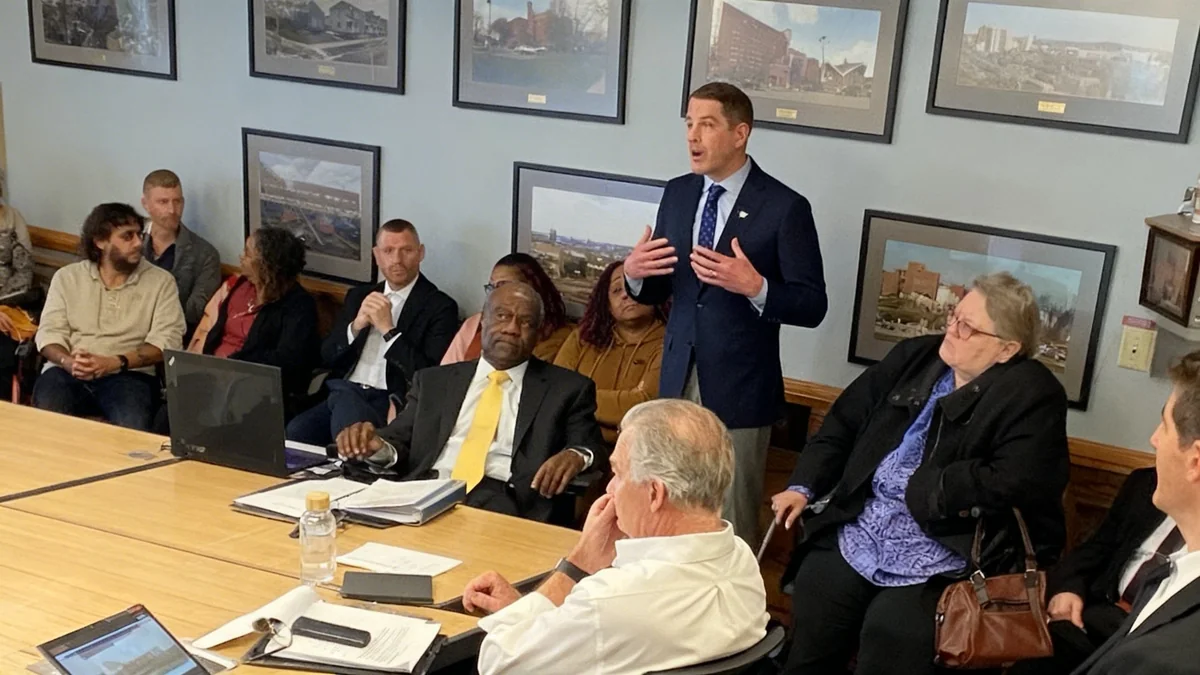Real estate developers and investors met with Oregon Governor Tina Kotek and Portland Mayor Keith Wilson in a private summit to address a significant downturn in apartment construction. During the meeting, industry leaders identified high taxes and public safety concerns as major obstacles, proposing that job and income growth are essential to revitalizing the city's housing market.
The closed-door session, held at the ZGF Architects' headquarters in downtown Portland, focused on finding solutions to a construction slowdown that participants warned could undermine city and state housing affordability objectives.
Key Takeaways
- Real estate leaders held a 2.5-hour private meeting with Governor Tina Kotek and Mayor Keith Wilson.
- The primary focus was the ongoing slump in Portland's apartment construction sector.
- Key concerns raised included high taxes, downtown safety, and the need for extended tax incentives.
- Developers identified job and income growth as critical factors for attracting new housing investment.
- The construction slowdown poses a direct threat to regional housing affordability goals.
High-Stakes Summit Addresses Construction Slowdown
A group of influential real estate investors and developers convened on Thursday for a critical discussion with Oregon's top political leaders. The 2.5-hour meeting aimed to diagnose the causes of a protracted slump in multifamily housing construction and collaboratively explore pathways to reignite development in Portland.
The summit brought together key figures from the development community with Governor Kotek and Mayor Wilson, reflecting the growing urgency of the issue. The slowdown in new apartment projects directly impacts the region's housing supply, which is a cornerstone of the administration's strategy to improve affordability for residents.
According to industry analysts, a sustained lack of new housing units can lead to increased competition for existing rentals, potentially driving up costs and exacerbating the affordability crisis that officials are working to solve.
Context: Portland's Housing Goals
Both the City of Portland and the State of Oregon have established ambitious goals for housing production. Governor Kotek, in particular, has made increasing the housing supply a central policy priority. A slowdown in the private development sector, especially for apartments, creates a significant challenge to meeting these targets and ensuring an adequate supply of homes for a growing population.
Core Challenges Identified by Developers
During the private discussions, industry representatives were candid about the factors they believe are deterring investment in Portland's housing market. Their concerns centered on the financial viability of new projects and the overall environment for business in the city's core.
Tax Burdens and Financial Viability
A recurring theme was the impact of high taxes on the feasibility of new construction. Developers pointed to a combination of property taxes, development fees, and other municipal charges that they argue make it difficult for new apartment projects to be profitable. These costs, they explained, are often passed on to renters, which can conflict with affordability goals.
One of the specific suggestions floated during the meeting was the extension of tax break programs for downtown development. Such incentives are designed to offset high initial costs and encourage construction in targeted areas, but their effectiveness and duration were key points of discussion.
The Cost of Construction
Nationally, the cost of multifamily construction has risen significantly due to material costs, labor shortages, and regulatory requirements. In a high-cost city like Portland, these national trends are compounded by local taxes and fees, creating a challenging financial landscape for developers aiming to build new apartment complexes.
Downtown Safety and Public Perception
Beyond financial metrics, real estate leaders voiced significant concerns about public safety in downtown Portland. They argued that perceptions of safety directly influence where people choose to live and, consequently, where investors are willing to build. A vibrant and safe downtown is seen as essential for attracting residents to new apartment buildings and ensuring the long-term success of these major investments.
The group stressed that a visible and sustained improvement in public safety is not just a social issue but a critical economic one for the future of downtown housing development. This sentiment connects the health of the urban core directly to the city's ability to expand its housing stock.
Proposed Path Forward: Focus on Economic Growth
While developers outlined several challenges, they also presented a clear vision for what they believe is the most sustainable solution: robust job and income growth. The core argument is that a thriving local economy is the fundamental driver of a healthy housing market.
When residents have stable, well-paying jobs, they can more comfortably afford market-rate rents. This consistent demand from a financially secure renter base reduces the risk for investors and makes them more likely to finance and build new apartment projects.
- Increased Renter Demand: A strong job market attracts new residents to the city, creating a larger pool of potential tenants.
- Improved Investor Confidence: Rising local incomes signal a stable market, making lenders and investors more willing to fund large-scale housing projects.
- Sustainable Growth: Unlike temporary incentives, a strong economy provides a long-term foundation for housing development without relying solely on public subsidies.
The message from the real estate community to the governor and mayor was clear: policies that foster economic development and attract high-quality jobs are, in effect, housing policies. They argued that this approach creates a positive cycle where economic prosperity fuels the housing construction needed to support a growing workforce.
Implications for Portland's Future
The outcome of this dialogue between developers and public officials could have lasting effects on Portland's urban landscape and its residents. If the construction slump continues, the city may struggle to keep pace with housing demand, potentially leading to lower vacancy rates and higher rents over time.
Conversely, a successful partnership that addresses the concerns around taxes, safety, and economic growth could unlock a new wave of development. This would not only increase the housing supply but also contribute to the revitalization of downtown Portland, creating a more vibrant urban core for residents and businesses alike.
The meeting represents a critical juncture where private sector concerns and public policy goals intersect. The next steps taken by the city and state will likely determine the direction of Portland's housing market for the foreseeable future.





